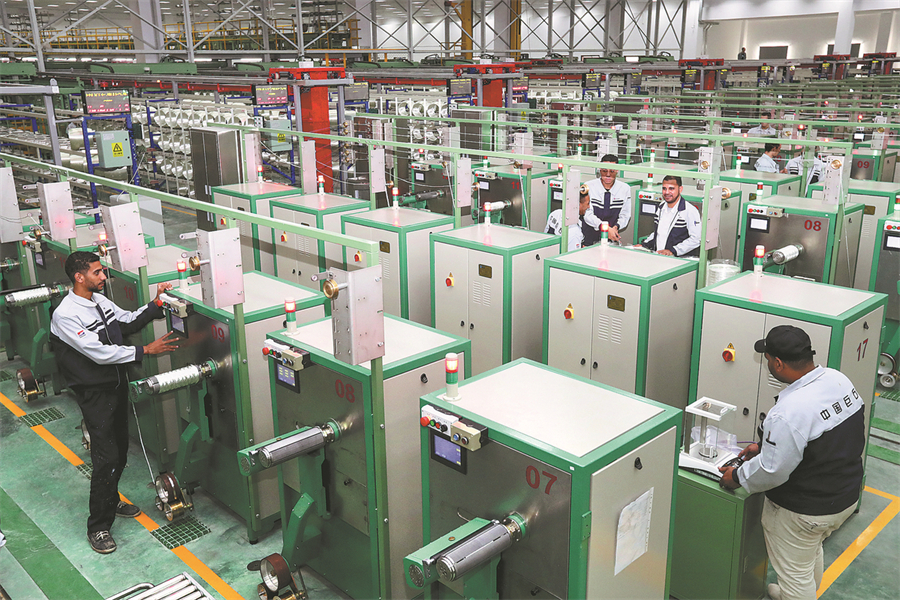Green ties to deepen partnership with Africa

Employees work on the production line of a Chinese-funded glass fiber plant in Egypt. [Photo/Xinhua]
China will forge green cooperation, deepen existing ties with African countries, increase investment on the continent, especially in markets involved in the Belt and Road Initiative, and promote the implementation of more projects, officials said on Wednesday.
As China continues to focus on high-quality development and speed up industrialization, the country hopes to further promote green and low-carbon cooperation with Africa, an official at the National Development and Reform Commission said.
"Green cooperation has become a new highlight of the collaboration between China and Africa. China will support domestic enterprises to invest in projects related to wind power, photovoltaic and biomass energy in Africa and strengthen the training of local talent," said Zhang Jianhua, deputy director of the foreign investment department at the NDRC, during a seminar in Beijing.
The government will also encourage Chinese enterprises to invest in agriculture in Africa and carry out more technological cooperation, as agricultural transformation is crucial to sustained growth. For instance, in Cote d'Ivoire, China has helped a region more than double its yield of rice, Zhang said.
China has remained Africa's largest trading partner for 14 straight years. China's imports of agricultural products from Africa have grown for seven consecutive years. China has become the second-largest importer of agricultural products from Africa, according to the Chinese Academy of International Trade and Economic Cooperation.
Besides, the government will encourage Chinese enterprises to strengthen cooperation with Africa in mining, home appliances, auto manufacturing, metallurgy and chemicals. Chinese enterprises may further invest in e-commerce and mobile payments in Africa, the NDRC said.
"Digital economy serves as a new engine for China-Africa economic development. Cooperation in e-commerce can help high-quality African products enter the China market, and help small and medium-sized enterprises in Africa to promote innovation in products, services and business models," said Yu Jia, a professor at Peking University.
Currently, more than 3,500 Chinese enterprises are operating businesses in Africa, and the inventory of their total direct investment in Africa has exceeded $56 billion. China and Africa have jointly built more than 20 industrial parks, according to the Ministry of Foreign Affairs.
"With an unstable global economy and supply chain, Sino-African cooperation faces a critical period as it tries to reach a higher level. Promotion of the transformation and upgrade of cooperation and high-quality development have become the tasks of the new era for the two sides," said Wu Peng, head of African affairs at the Foreign Ministry.
Africa has been an important participant in the BRI. Among the 53 African countries that have established diplomatic relations with China, 52 countries and the African Union Commission have signed cooperation agreements with China to jointly contribute to the BRI.
This year, China Civil Engineering Construction Corp, or CCECC, a subsidiary of State-owned China Railway Construction Corp Ltd, plans to invest more resources to expand its market share in new types of infrastructure in Africa.
In January, the company put the first phase of the Lagos Rail Mass Transit Blue Line project in Nigeria — the first electrified light rail in West Africa — into operation. It said the light rail in Lagos is a flagship project under the BRI framework.
"In addition to building traditional infrastructure projects such as roads, bridges and railroads, we plan to seize new business opportunities emerging in the transformation of the global industrial chain and market revitalization in Africa, as part of building 'new infrastructure' like 5G towers, big data centers, the internet of things facilities and digital hubs in the next few years," said Jiang Yigao, vice-president of CCECC.
Jiang said next, projects including the building of 5G base stations and new energy businesses such as wind power and photovoltaic power generation, as well as electrified urban railway projects, will be the company's priorities in Nigeria and other West African countries.
























